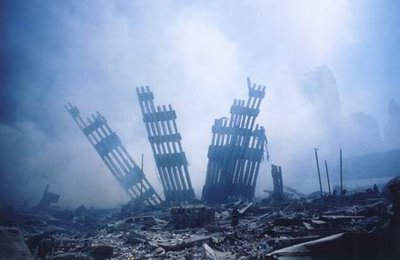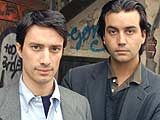 Back in March, Maggie made a post about the film Loose Change, generating much discussion, both online and off. At the time, I argued that the film was sloppy and propagandistic -- and as such, a contribution to the dumbing down of American political discourse. A month or so ago, my roommate introduced me to another 9/11 film (approriately titled 9/11), which I would like to offer as an alternative to Loose Change.
Back in March, Maggie made a post about the film Loose Change, generating much discussion, both online and off. At the time, I argued that the film was sloppy and propagandistic -- and as such, a contribution to the dumbing down of American political discourse. A month or so ago, my roommate introduced me to another 9/11 film (approriately titled 9/11), which I would like to offer as an alternative to Loose Change.
In the months before September 11th, two French filmmakers, brothers Jules and Gédéon Naudet, came to New York to make a documentary about a rookie firefighter. The first months of shooting were uneventful, but on September 11
th the brothers were there filming with the fire department. The film contains one of the only two known recordings of the first plane hitting the Trade Center, as well as the only footage shot inside the
towers on September 11th.
 Unlike Loose Change (as well other documentaries such as Fahrenheit 9/11 and Why We Fight) 9/11 is not propagandistic. Nor does it turn its subject matter into a melodrama as have some fictional films on the subject. Unlike the former films, it is a documentary in the sense that it actually documents, to a large extent, what it was like to be a firemen inside the towers, as well as in the time before and after the crash.
Unlike Loose Change (as well other documentaries such as Fahrenheit 9/11 and Why We Fight) 9/11 is not propagandistic. Nor does it turn its subject matter into a melodrama as have some fictional films on the subject. Unlike the former films, it is a documentary in the sense that it actually documents, to a large extent, what it was like to be a firemen inside the towers, as well as in the time before and after the crash.
Watching 9/11, one remembers how unprecedented the event was which it depicts – something easy to forget after five years of having it abstracted and hammered into our political subconscious. As a film, it is deceptively simple: it seems to be little more than the Naudet brothers’ footage skillfully edited and honestly narrated. But as one watches, it quickly becomes clear how much has changed in the five intervening years since it was shot. Today, the firefighters' can-do attitude seems like innocence almost unimaginable in a world of terrorist threat levels and electronic surveillance. When the firemen close off one of the exits of Tower One or put labels on the front desk “just to make it obvious to people” which tower they are in, it seems almost naïve. Today, even when the subway stops for 10 minutes to wait for clearance it’s hard not to have a moment of panic.
 It almost seems appropriate then, when during the break (in the TV version), we are treated to mini-lecture from Tom Ridge on the necessity for a Department of Homeland Security. Obviously this is not actually part of the movie, but viewed from the vantage point of 2006, it seems a clear example of how the emotion of 9/11 was expressed (or, if you will, manipulated) politically. For me, one of the most fascinating parts of 9/11 is contrasting the mentality of five years ago with today's, and this "commercial break" provides a clue about how this transition came about.
It almost seems appropriate then, when during the break (in the TV version), we are treated to mini-lecture from Tom Ridge on the necessity for a Department of Homeland Security. Obviously this is not actually part of the movie, but viewed from the vantage point of 2006, it seems a clear example of how the emotion of 9/11 was expressed (or, if you will, manipulated) politically. For me, one of the most fascinating parts of 9/11 is contrasting the mentality of five years ago with today's, and this "commercial break" provides a clue about how this transition came about.
Although it is a bit long and at moments heart-wrenching to watch, 9/11 is definitely worth seeing even if only to remind us of the way we were. It received very little press in the US (or at least little that I can remember, and certainly little in comparison to Fahrenheit 9/11) which I find surprising since it is by far the best contemporary documentary I have seen in a while. It is available here from google video with French narration and here as it was aired on ABC.



